Resources for Immunology Flipped Course
Leading scientists explain the fundamentals of the inflammatory response, B and T cell development, autoimmunity, and plant immunology. This course is designed as a graduate-level introduction to immunology.
[not_logged_in]To access the curricula you must register as an educator. If you are already registered, then log in here.
[/not_logged_in]
| Title | Video | Concepts | Duration | Video Downloads | Transcript | PDF Resources (Educators Only) |
|---|---|---|---|---|---|---|
|
Session 1: Introduction: Which Cells Are the Players?
Starting with a basic review of the immune cells, this session provides a general overview of the immune system and its activation. With: Brittany Anderton, Ira Mellman |
All Course Materials for this Session (Educators only) |
|||||
| The Cells of the Immune System | 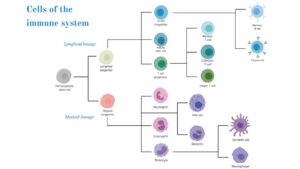
|
Review of the immune cells, innate and adaptive immune systems, antigen presentation, T cell activation via MHC-I and MHC-II molecules. | 00:05:54 |
Hi-Res Low-Res Subtitled: |
View Transcript | |
| The Immune System | 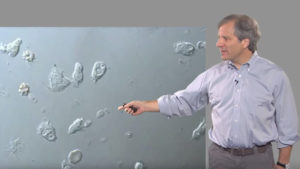
|
Recognition of self- versus non-self, dendritic cells, lymphoid tissues, innate versus adaptive immunity, inflammation, macrophages, Toll-Like Receptors, B cells, T cells and T cell receptors, CD8/CD4 T Cells, and T cell communication with dendritic cells | 00:35:31 |
Hi-Res Low-Res Subtitled: |
View Transcript | |
| Cellular Basis of the Immune Response | 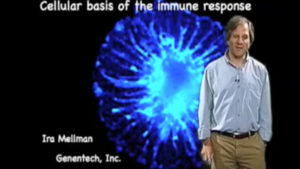
Note: Please watch original video from time 31:57 to 38:30. |
MHC Class I molecules and activation of CD8+ cytotoxic T cells | 00:06:33 |
Hi-Res Subtitled: |
View Transcript | |
|
Session 2: The Inflammatory Response: Activation of the Innate Immune System
This session will help you understand the molecular basis of inflammation. In summary, the body has specialized immune cells (sensor cells) that detect homeostasis disturbances and activate a series of responses that help clear the inflection and restore homeostasis. With: Ruslan Medzhitov |
All Course Materials for this Session (Educators only) |
|||||
| Introduction to Inflammation | 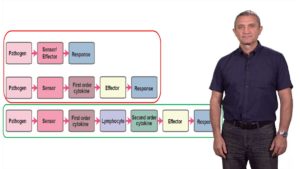
|
Homeostasis, inflammation, sensors, effector cells, mediators, and resolution | 00:36:30 |
Hi-Res Low-Res Subtitled: |
View Transcript | |
| Inflammation and Disease Tolerance: Surviving Acute Illness | 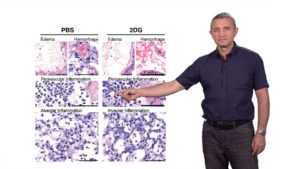
|
Pathology of inflammation. Explains the connection between insulin/glucose homeostasis and the organismal response to viral and bacterial infections. | 00:30:35 |
Hi-Res Low-Res Subtitled: |
View Transcript | |
|
Session 3: Bridging Innate & Adaptive Immunity
This session provides an overview of regulation of the acquired immune system and the crosstalk that happens between innate and adaptive immunity. With: Ruslan Medzhitov, Ira Mellman |
All Course Materials for this Session (Educators only) |
|||||
| Antigen Presentation and Dendritic Cells | 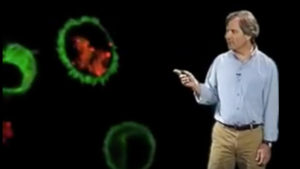
Please watch original video from time 00:00 to 25:33 (Clip Link). |
Link between innate immunity and adaptive immunity, MHC-I & MHC-II mediated activation, function and maturation of dendritic cells, antigen cross-presentation, activation of T cells by dendritic cells, T cell tolerance, and regulatory T cells (Tregs) | 00:25:28 |
Hi-Res Subtitled: |
View Transcript | |
| Antigen Presentation and Dendritic Cells | 
Please watch original video from time 35:07 to 49:42 (Clip Link). |
Link between innate immunity and adaptive immunity, MHC-I & MHC-II mediated activation, function and maturation of dendritic cells, antigen cross-presentation, activation of T cells by dendritic cells, T cell tolerance, and regulatory T cells (Tregs) | 00:14:37 |
Hi-Res Subtitled: |
View Transcript | |
| The Role of Toll-Like Receptors in the Control of Adaptive Immunity | 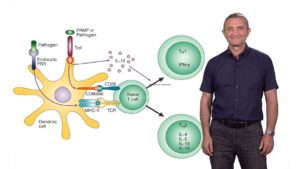
|
Immune recognition of self versus non-self, identification and characterization of Toll-Like Receptors, activation of adaptive immunity | 00:20:58 |
Hi-Res Low-Res Subtitled: |
View Transcript | |
|
Session 4: Molecular View of Adaptive Immunity
This session provides a molecular overview of T cell receptor (TCR) activation and signaling. It shows how TCRs bind to their corresponding peptide-MHC complexes to form the immunological synapse. With: Michael Dustin |
All Course Materials for this Session (Educators only) |
|||||
| The Immunological Synapse: Antigen Recognition | 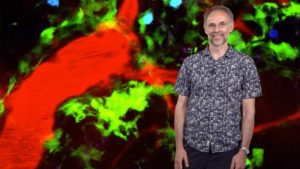
Note: Please watch original video from time 16:50 to 36:57. |
T cell receptor (TCR) activation and signaling cascade, components of the immunological synapse | 00:20:07 |
Hi-Res Low-Res Subtitled: |
View Transcript | |
| The Immunological Synapse: Signaling and Function | 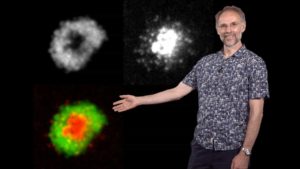
|
Immunological synapse, role of CD45 in the activation of the immunological synapse, cancer- immunotherapy, function of actin/WASp in the immunological synapse, and synapse vs kinapse | 00:30:18 |
Hi-Res Low-Res Subtitled: |
View Transcript | |
|
Session 5: B Cells: Development, Selection, and Function
This session showcases the generation of antibody diversity (via V, D, J recombination), and the mechanisms that ensure the proper function of B cells (pre-BCR signaling and tolerance). With: Shiv Pillai, Hidde Ploegh |
All Course Materials for this Session (Educators Only) |
|||||
| Early B Cell Development: A Look at the Defining Questions in Immunology | 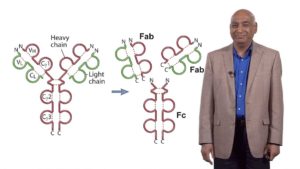
|
Historical perspective of the study of immunology, antigens/antibodies, side chain hypothesis, clonal selection hypothesis, antibody structure & function, generation of antibody diversity via VDJ recombination, and tolerance. | 00:37:33 |
Hi-Res Low-Res Subtitled: |
View Transcript | |
| Bruton Tyrosine Kinase Signaling: The pre-B Cell Receptor and B Cell Differentiation | 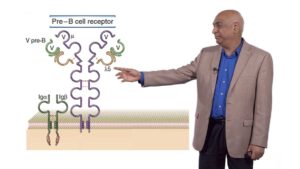
Note: This video is optional for this session. |
B cell biogenesis, allelic exclusion, discovery of pre-B cell receptor (pre-BCR), LIAR hypothesis, pre-BCR and Btk signaling cascades. | 00:23:27 |
Hi-Res Low-Res Subtitled: |
View Transcript | |
| Immunology: The Basics of Antibody Diversity | 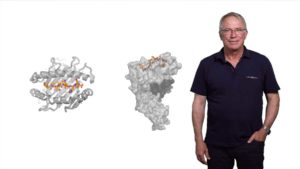
Note: Please watch original video from time 20:30 to 38:50. |
B cell development, class-switch recombination, T cell receptor recombination, MHC complex assembly, and pathogen disruption of T-cell mediated immunity. | 00:18:21 |
Hi-Res Low-Res Subtitled: |
View Transcript | |
|
Session 6: T Cells: Development and Differentiation
This session provides an overview of T cell development and differentiation. It covers two important mechanisms that prevent autoimmunity (central and peripheral tolerance) and characterizes the biogenesis and function of two specialized T cells (Tregs and Th17 cells). With: Dan Littman, Diane Mathis |
All Course Materials for this Session (Educators Only) |
|||||
| An Introduction to T Cell Tolerance | 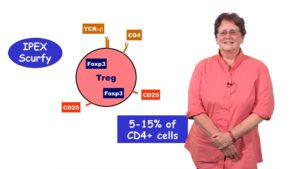
Note: Please watch original video from time 2:06 to 36:39. |
Central and peripheral tolerance, type-1 diabetes (example of autoimmune disease), and Treg biogenesis and function. | 00:34:33 |
Hi-Res Low-Res Subtitled: |
View Transcript | |
| Th17 Cells and Innate Lymphoid Cells in Barrier Defense and Inflammatory Diseases | 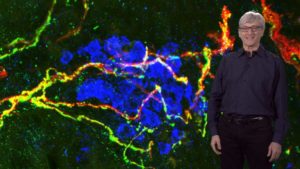
Please watch original video from time 1:55 to 31:25 (Clip Link). |
T cell differentiation, characterization of CD4+ cells, and review of Th17 role in autoimmune diseases | 00:29:29 |
Hi-Res Low-Res Subtitled: |
View Transcript | |
|
Session 7: Autoimmunity and Allergy
Allergy and autoimmunity occur when immune cells are activated by non-pathogenic antigens. This session explores the molecular underpinnings of allergies and autoimmunity. With: Avery August, Diane Mathis, Ted Yednock |
All Course Materials for this Session (Educators Only) |
|||||
| Allergies and the Immune System | 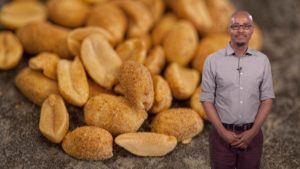
|
IgE, mast cell and basophil response to IgE, and allergic response | 00:15:55 |
Hi-Res Low-Res Subtitled: |
View Transcript | |
| Transcription Factor Aire Orchestrates T Cell Tolerance | 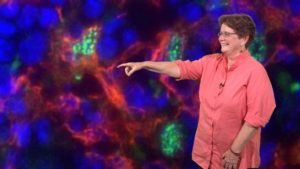
|
APS-1 Syndrome, AIRE protein role in T cell tolerance, AIRE expression/localization, and importance of Tregs for APS-1 | 00:37:23 |
Hi-Res Low-Res Subtitled: |
View Transcript | |
| Discovery and Development of Natalizumab for the Treatment of Multiple Sclerosis | 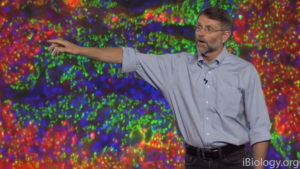
Note: This video is optional for this session. |
Introduction to multiple sclerosis (MS), EAE mouse model to study MS, 𝛼4𝛃1-Integrin, Anti-𝛼4𝛃1-Integrin experiments before & post MS manifestation, and development of Tysabri (Natalizumab) | 00:34:53 |
Hi-Res Low-Res Subtitled: |
View Transcript | |
|
Session 8: Plant Immunity and the Evolutionary Arms Race between Host and Pathogen
This session covers the basics of plant immunology and reviews two major pathways that activate the plant immune response: Effector-triggered immunity and Pattern-triggered immunity. With: Sheng-Yang He, Harmit Malik |
All Course Materials for this Session (Educators Only) |
|||||
| Introduction to Plant-Pathogen Interactions | 
|
Effector-Triggered immunity, Avr genes versus resistance genes, bacterial Type-II Secretion system, indirect recognition by R proteins, and Pattern-Triggered immunity | 00:19:28 |
Hi-Res Low-Res Subtitled: |
View Transcript | |
| Host and Viral Evolution: Molecular Evolutionary Arms Race Between Primate and Viral Genomes | 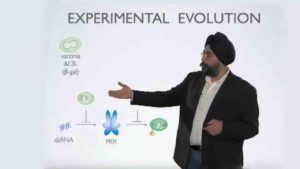
|
Molecular arms races between primate and viral genomes, host evolution, host-virus interactions, natural selection of mutations, and PKR signaling evolution across primates | 00:32:50 |
Hi-Res Subtitled: |
View Transcript | |
| Arabidopsis thaliana-Pseudomonas syringae interaction: The effect of climate in plant disease | 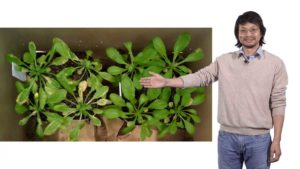
Note: This video is optional for this session. |
Arabidopsis - P. Syringae model system of infection, role of environment (temperature & humidity) in plant disease, pattern-triggered immunity & effector inhibition, and water soaking as a symptom of bacterial infection in leaves | 00:29:07 |
Hi-Res Low-Res Subtitled: |
View Transcript | |
|
Session 9: The Immunology of Organ Transplantation
In this session, you will learn about the major types of transplantation, evaluate the immune cells involved in organ rejection, and understand the basics of transplantation tolerance (long-term graft acceptance without the long-term use of immunosuppressants). With: Megan Sykes |
All Course Materials for this Session (Educators Only) |
|||||
| Introduction to Transplantation: The Immune Response to Allo- and Xenotransplantation | 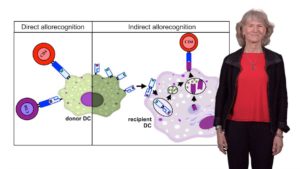
|
Allo- and Xenotransplantation, immune cells involved in transplantation rejection, HLA matching, acute & chronic rejection, direct & indirect T Cell response, immunosuppressive drugs, and hematopoietic cell transplantation | 00:32:19 |
Hi-Res Low-Res Subtitled: |
View Transcript | |
| Taming and Tracking the Human Alloresponse | 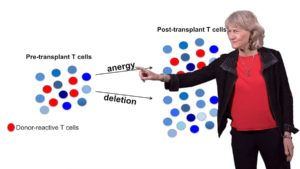
|
Transplantation tolerance, and mixed chimerism | 00:37:40 |
Hi-Res Low-Res Subtitled: |
View Transcript | |
| Xenotransplantation | 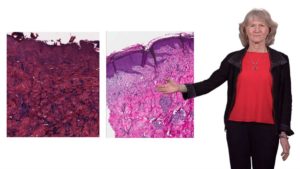
Note: This video is optional for this session. |
Xenotransplantation, 𝛼1,3-Gal, genetically engineered pigs for organ transplants, xenograft rejection, tolerance induction, mixed chimerism, CD47 signaling/macrophages in xenotransplantation | 00:31:32 |
Hi-Res Low-Res Subtitled: |
View Transcript | |
|
Session 10: The Immune Response in Health and Disease
This session evaluates two examples of the interaction between pathogens and the human immune system: human papillomavirus (HPV) and tuberculosis pathogenesis. With: Lalita Ramakrishnan, John Schiller |
All Course Materials for this Session Educators Only |
|||||
| Why Do HPV Virus-Like Particle Vaccines Work So Well? | 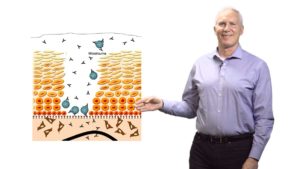
|
Human Papillomavirus (HPV), HPV susceptibility to neutralizing antibodies, B cell receptor/Virus-like particle complex, and importance of viral infection timeline | 00:34:26 |
Hi-Res Low-Res Subtitled: |
View Transcript | |
| An Introduction to Tuberculosis: The Pathogenic Personality of the Tubercle Bacillus | 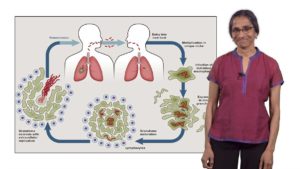
|
Overview of tuberculosis (TB), TB prevalence worldwide, life cycle of TB, TB pathogenesis (infection of macrophages & granulomas), efflux pumps, and TB vaccine | 00:34:44 |
Hi-Res Low-Res Subtitled: |
View Transcript | |
| The Troublesome Tubercle in Tuberculosis | 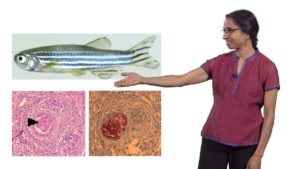
Note: This video is optional for this session. |
TB bacterium's use of granuloma to attract macrophages and increase infectivity, Mycobacterium marina - a model to study TB in zebrafish, granuloma promotes growth of the TB bacteria, and expansion of disease via macrophage apoptosis | 00:29:42 |
Hi-Res Low-Res Subtitled: |
View Transcript | |



